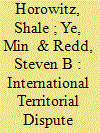| Srl | Item |
| 1 |
ID:
174819


|
|
|
|
|
| Summary/Abstract |
Within international relations theory, there is significant disagreement on the nature and significance of leaders’ dispute outcome preferences. While many variants of realism assume that such preferences are relatively fixed and homogeneous, both the liberal and the constructivist schools view them as significant variables. This debate remains unresolved because, for the standard large-sample conflict data sets, there are no direct measures of leadership preferences over outcomes in given types of international disputes. Using a conflict bargaining experiment, we ask whether, after controlling for the effects of relative power and initial conditions, leadership preferences have a statistically significant impact. We use two different country samples—from China and the United States—to examine whether the impact of leadership preferences varies internationally. We find that realist-style preferences are a special rather than a general case, and that such differences have significant implications for understanding continuities and changes in Chinese and US foreign policies.
|
|
|
|
|
|
|
|
|
|
|
|
|
|
|
|
| 2 |
ID:
159574


|
|
|
|
|
| Summary/Abstract |
In the conflict bargaining literature, three variables have a primary explanatory role: relative power, status quo conditions, and leadership preferences. While leadership preferences loom large in case study research, they are either absent or poorly proxied in large-N statistical studies. Using a series of three experiments, we test for the effects of relative power, status quo conditions, and leadership preferences on decisions to apply various levels of nonviolent and violent pressure in ethno-territorial disputes. The experimental designs presented in this study offer the opportunity to isolate the impact of leadership preferences on political strategy choices in ethno-territorial disputes. The results demonstrate that, at least in an experimental setting, leadership preferences are, in fact, significant predictors of political strategy choices, even after controlling for relative power and status quo conditions.
|
|
|
|
|
|
|
|
|
|
|
|
|
|
|
|